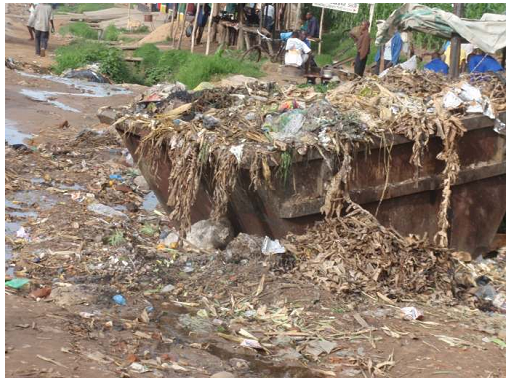
Lilongwe, Blantyre and Mzuzu city council offices have reported that insufficient staff, inappropriate collection vehicles, limited operating budgets and growing, hard to reach populations are among the challenges that the council offices continue to face. Poor waste management reduces the quality of life by providing food and breeding conditions for vermin and disease vectors, producing odor, diminishing aesthetics and contaminating surface and ground water (Hoornweg and Bhada-Tata 2012,).
Blantyre Located in the southern region of Malawi, is a commercial city as well as the second largest city in the country. The population of Blantyre was 661,256 in 2008 (National Statistical Office 2008). Over 70% of the population lives in unplanned areas, which occupies 23% of the land area in Blantyre (UN-Habitat 2012).
The Blantyre city council provides a collection vehicle (and semi-controlled dumping) of waste in formal areas while informal areas are left unserved. In instances where waste is not collected by the council, it is either left on road sides or river banks, which has resulted in surface and ground water contamination.
Malawi’s current Waste Disposal Crisis
Lilongwe is the largest city in Malawi with 670,000 people growing by a rate of 4.3 percent per year, one of the fastest growing regions in the country. The city has experienced an influx of rural immigration in the recent past years due to anticipation of good life in urban areas through employment and businesses. But with the growth the city’s major challenges has been dealing with waste management. The monitoring and evaluation office of community servings investment promotion statics show that the city generates 109 tonnes of solid waste per day; of the total, 15 percent derives from industries, 25 percent from commercial areas, 20 percent from hospitals and 40 percent from residential areas. The statics indicate that the city has been hit by a sanitation problem in solid and liquid waste management. An environmental expert Moses Chirambo, commented on Lilongwe’s waste management challenge saying, “Being the country’s fastest growing city due to rural-urban immigration, there are increased challenges in solid waste management on the part of the assembly as there is little or no participation from the community’’.
The lack of institutional support in most parts of Blantyre and Lilongwe led to the adoption of independent or community-led solutions. The residents have started paying independent contractor to fill the role that is left empty by the authorities (i.e., regular collection, transport and disposal). There is great potential if there is improved solid waste management through improved collection at community level if the community managed solid waste collection schemes are to be licensed fully by the city councils. The Participation by individual companies in waste management is a great opportunity and has several benefits including: Helping the nation achieve sustainable development goals, improves corporate image for the company /institution Ensures easy regulatory compliance for the company.
Malawi Government’s Role in Waste Management
Although the Malawi government ban the use of thin Plastics as an approach to reduce waste generation especially for the waste which is difficult to manage at the end of the waste, thin plastics cause serious issues when it comes to waste management. Plastic is synthetic and the material is both hazardous and non- biodegradable. The plastic has negative impacts on aesthetics, water quality, air quality and soil integrity and in order to address the problem of plastics Government should take the implementation of the ban on Thin Plastics seriously.
Malawi records a high number infection risks (which among others includes TB) and waste management challenges because of the ongoing project activities, an Infection Control and Waste Management Plan is deemed necessary, at this point its an emergency.
Studies have shown that Malawi’s current situation of TB infection control measures and health-care waste management procedures cannot guarantee safety among health-care workers, patients, and the general population.
Reviewing national policies and legislative framework related to TB infection control and waste management, and existing documentation on Malawi’s health-care waste management plans from time to time is crucial.
How Malawi can fix Waste Management Problems
- Government should partner with the public sector and create multiple companies in each district that focuses on waste management and the education of waste management to their designated district. Just cleaning up the trash isn’t enough, the public must also learn why it is important to do so.
- Add new policies and laws that make it an offense to litter, and this is important, we all know we are not suppose to do that, but now it has to be enforced! It’s not a law if it is never enforced.
- MALAWI MUST RECYCLE: My goodness, if we only had people who were actually serious about the environment and the major role it plays in literally everything. Recycling is a must for the Government and public sector to venture into.
- Create a waste management division in each Government ministry(if not already done), and make sure they report to the Manager and the public via social media and official website about the progress they are making. If they are cleaning the city, lets see photos and videos each and every week of such activities.
- Create more dump sites that must automatically incorporate RECYCLING and the ability to turn waste into something useful, like energy(this is now possible).
- Implement a financial management plan, and
The management of waste in general, is still a problem in the country and there is a need to critically look into practices of managing chemical and other hazardous wastes, need for capacity building cannot be over emphasized and intensifying awareness raising among the citizenry. A clean and healthy environment is possible but it requires every citizen to understand their responsibility from the packaging for collection and disposal of wastes.
